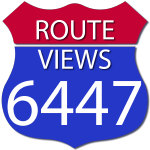April 15, 2009
DATA FORMAT CHANGE NOTIFICATION: RIB DUMP FILE FORMAT
We have been migrating to MRT TABLE DUMP V2 format for RIB files. This has been occuring as we have been updating hardware and software on the collectors. Data handlers may need to update their tools to accomodate the use of this format. The RIS libbgpdump tools should be sufficient in most cases.
The following collectors now utilize this format:
- route-views2.routeviews.org
- route-views4.routeviews.org
- route-views6.routeviews.org
Ultimately, all of the Route Views collectors will be transitioned to this format. The newer tools are capable of reading both old and new format files. Collectors still operating with the older format are:
- route-views.paix.routeviews.org
- route-views.eqix.routeviews.org
- route-views.wide.routeviews.org
- route-views.kixp.routeviews.org
One file of particular interest has been the historical route-views ASCII file. This was a “show ip bgp” screen dump from the original route-views router up until April of 2008. Between then and now it has been derived from converting the route-views2 collector RIB files. As of April 2009, this file will exhibit information derived from the RIB DUMP V2 format files that are now on the route-views2 collector. Typically, the location of this file looks like: ftp://archive.routeviews.org/oix-route-views/2009.04/oix-full-snapshot-latest.dat.bz2
It should be noted that the recommended procedures for handling RIB files is to download them and process them using the various MRT tools. The ASCII conversions are provided merely as a convenience for historical continuity, and are likely to be discontinued at some point. For more information regarding this format, see the following references:
- http://www.quagga.net/download/quagga-0.99.11.tar.gz
- http://www.ris.ripe.net/source/libbgpdump-1.4.99.11.tar.gz
- http://tools.ietf.org/html/draft-ietf-grow-mrt-09
For example, the “bgpdump” tool in the libbgpdump library can output an ASCII dump of the RIB files in mode 0 (default), mode 1 (-m), and mode 2 (-M). One of these modes should be sufficient for matching ASCII formats of earlier data if required.
